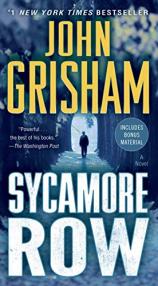Sycamore Row
Review
Sycamore Row
When you are one of the world’s bestselling authors, it is easy to rest on your accomplishments. Create an endearing character, follow a basic plot formula, publish a book annually, and wait for your latest effort to appear on the bestseller lists. With hundreds of millions of books sold, John Grisham could easily fall into the rut of a tired and stale effort. But that does not seem to be his style. Grisham’s novels often reflect on topical political and legal themes. In THE INNOCENT MAN, a nonfiction work, he chronicled a true legal injustice: the conviction and death sentence of Ron Williamson in Ada, Oklahoma. Occasionally Grisham deviates completely from this format and offers readers a sports-themed novel. He refuses to allow his writing to be typecast.
For the first time in his career, Grisham has written a sequel to one of his bestsellers. A TIME TO KILL was his debut novel but not his first bestseller. It was rejected by most publishers but received a publication run of 5,000 copies by Wynwood Press. Subsequently, he turned out THE FIRM, THE PELICAN BRIEF and THE CLIENT. Doubleday then re-released A TIME TO KILL, and it became a bestseller, a movie, and currently is being performed on Broadway. Perhaps that unusual history prompted Grisham to return to his debut. SYCAMORE ROW sends readers back to rural Mississippi, three years after the events of A TIME TO KILL.
"A prolific writer such as Grisham always runs the risk of turning out a clunker. But he has the knack for finding topical themes, inventive plot twists and the appropriate criticism of the legal profession to make his novels entertaining and page-turning.... SYCAMORE ROW will not disappoint fans."
The opening chapters of SYCAMORE ROW remind readers of those events. Jake Brigance, a young attorney, successfully defended Carl Lee Hailey in a racially charged trial in the small Ford County community of Clanton, Mississippi. Hailey had killed two men who raped his 10-year-old daughter. The racial issues raised by the African-American Hailey shooting the two white rapists tore the small town apart. Brigance’s courtroom victory came at a substantial price, as Klan members destroyed his home and terrorized his family and friends. Even now, three years after the trial, Brigance has seen little benefit from his great courtroom victory. His law practice has not benefited financially, he lives under law enforcement protection, and he has added a nine-millimeter pistol to his wardrobe.
SYCAMORE ROW opens with the suicide of Seth Hubbard. Near death from lung cancer, Hubbard takes his life by hanging himself. The next day, Brigance receives a letter written by Hubbard the day before his death. Included is a handwritten will and instructions for defending the will in court. Ninety percent of Hubbard’s substantial estate is left to his housekeeper, Lettie Lang. Obviously Hubbard’s disinherited children are going to contest the will. The battle is joined.
Many of the characters who were in A TIME TO KILL are back in SYCAMORE ROW. Of course, Jake, his wife Carla and their daughter are important characters in the story. Most of the denizens of Clanton also appear on these pages. More important are the issues and spirit that are present. The passage of three years has not changed the racial issues that confront rural Mississippi. Grisham captures the south of the 1980s facing the evolution of the civil rights era. In A TIME TO KILL, it was race and crime; in SYCAMORE ROW, it’s race and money.
While almost all of Grisham’s novels contain legal themes, his characters are not always heavily involved in courtroom activity. SYCAMORE ROW is a courtroom novel, and because it involves a civil case, a contested will, it allows for some interesting courtroom scenes. Grisham portrays lawyers and judges in a somewhat wistful manner. His judges rule with an iron hand, his lawyers are often greedy and duplicitous, except for the noble white knights battling injustice wherever it appears. Lawyers with courtroom experience who read Grisham understand all too well that real courtrooms are not like the ones portrayed in this book. But it really does not matter one bit. Plot trumps the truth in most courtroom novels.
A prolific writer such as Grisham always runs the risk of turning out a clunker. But he has the knack for finding topical themes, inventive plot twists and the appropriate criticism of the legal profession to make his novels entertaining and page-turning. He is not William Faulkner but makes no claim to be such a writer. Comfortable in the knowledge that he entertains readers, Grisham continues to turn out great novels. SYCAMORE ROW will not disappoint fans.
Reviewed by Stuart Shiffman on October 25, 2013





